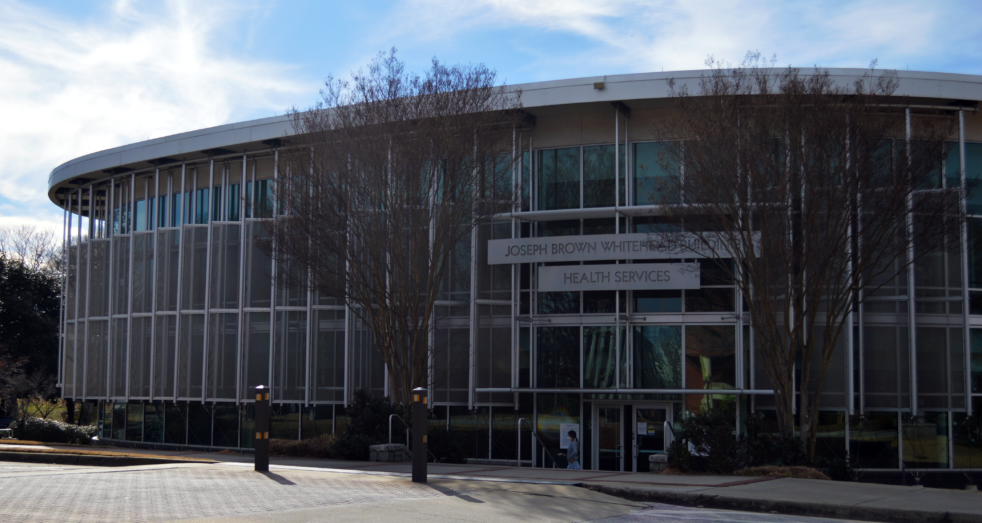As temperatures reach their annual lows, respiratory illnesses like COVID-19 are becoming more prevalent. The most pervasive COVID-19 strain, JN.1, is slightly more infectious than previous strains but evokes mild symptoms. The Institute is aware of the rise in infections and is mindfully tracking the fluctuation in infection rates through its COVID-19 wastewater detection system.
Since 2020, Tech has implemented a COVID-19 wastewater detection system, which, along with the conventional oral COVID-19 testing, has become an accurate indicator of COVID-19 infection rates on campus.
“There are several waste collection sites on campus, five or six of them, where they collect samples twice a week,” said Dr. Benjamin Holton, the Senior Director of Stamps Student Health Services. “Then those samples are analyzed using the same PCR test that we used for surveillance testing during the height of COVID.”
Wastewater testing uses PCR tests, which identify a pathogen’s RNA or DNA, to test viral matter that is found in fecal matter. Depending on the variant and the infected person, the concentration of viral material can differ.
Recent construction near one of the wastewater sites has slightly impacted its results, but general trends suggest that infections are still rising. Besides this temporary construction, the only downside of large-scale wastewater testing is its inability to diagnose individual cases.
“There’s not a one-to-one correspondence between cases in wastewater and the number of clinical cases, so it’s helpful from a trend standpoint, but it can’t tell you exactly how many cases of COVID there are,” Holton said.
Wastewater testing is the most sensitive, reliable way to examine the COVID-19 trends over time because it does not rely on student testing, and it is especially important as the new JN. 1 variant becomes more predominant.
According to the Centers for Disease Control and Prevention, “As of January 5, 2024, JN.1 is estimated to account for approximately 62% (range 55-68%) of all currently circulating SARS-CoV-2 variants, an increase from the estimated prevalence of 44% (range 39-50%) two weeks ago.”
Fortunately, the JN.1 variant has generally not caused any reactions as severe as the first few strains of COVID-19, but Stamps is still expecting a slight increase in COVID-19 cases.
“What happens in the community is often reflected here at Georgia Tech, and the beginning of the semester is always a time where we see an increase in cases,” Holton said. “I would not be surprised if we see an increase in activity at the beginning of this semester, particularly with the new variant circulating.”
This increase in cases is unsurprising given respiratory illnesses are more prominent during the winter months. People tend to congregate indoors more frequently, which can lead to closer contact with infected patients. Similarly, the cold, dry air and temperature change can hamper your immune system and slow down your ability to clear the mucus in your nose, making it easier for viruses to infect our bodies, according to
Horizon Health News.
With potential cases rising and students becoming busier, it can be harder to find time to test for COVID-19, which increases the necessity of the COVID-19 waste water detection system. Caroline Seehorn, first-year BMED, has found it difficult to schedule an appointment and walk over to Stamps in between her classes.
“It is reassuring to know Tech isn’t just relying on students testing because I know it can sometimes be unreliable and hard to find the time to test,” she said.
Getting vaccinated against COVID-19 is still the best defense against the viral infection. Even if students are not part of high-risk populations, vaccinations allow them to avoid unnecessary illness and help protect at-risk populations.
“Young people can get ill from COVID-19, and it can be more serious than the typically mild cold symptoms, but getting vaccinated helps reduce the risk of transmitting it to others,” Holton said. “By building herd immunity, where everyone has some protection, you can protect those who are most vulnerable.”
Tech offers easy, accessible vaccination through the Stamps Health Services, and students can schedule an appointment through the Tech pharmacy. It is also important to stay vigilant and up-to-date with the latest CDC measures to combat the disease.
“I love Stamps. It is so convenient because not only is it on campus, but they prioritize the highest quality of care,” said Kate Trotter, a first-year ARCH student. “They know as Tech students we have a lot going on, so they are very time efficient and respectful of us being students.”
